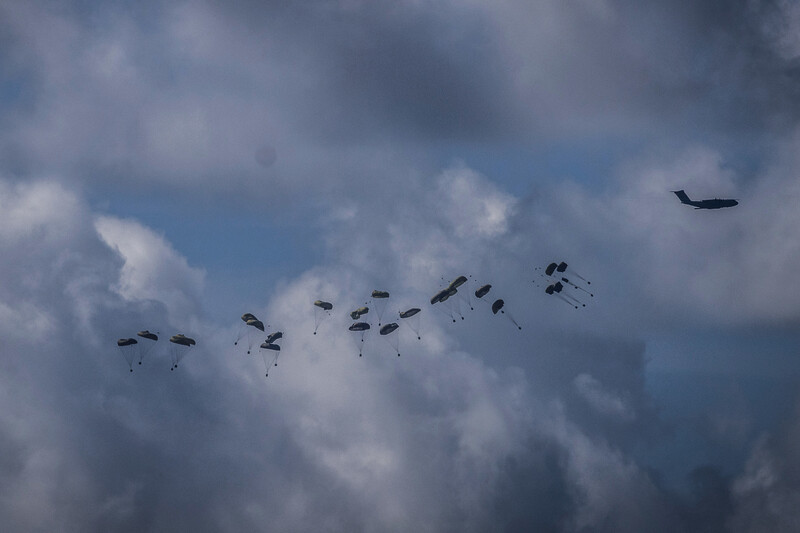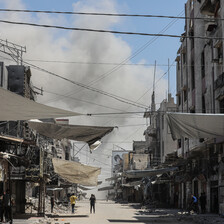The Electronic Intifada 1 July 2025

International airplanes drop aid over the northern Gaza Strip, as viewed from Sderot, Israel, 7 March 2024.
DPA via ZUMA Press / APA imagesI turned yellow last year, in May. My whole body dripped with sweat and I was more exhausted than I had ever been with any prior illness. I couldn’t move my body while in bed, much less get out of bed.
I thought it was the flu and that it would pass. I was confined to our house in al-Nasr neighborhood in western Gaza City. At the time, we had been among the first to return to the neighborhood, and the streets were empty.
My phone was often dead due to a lack of charge – recharging a phone is an errand that requires leaving the house and going to a charging station – and even if I had enough battery, the internet was frequently cut. I was bored and escaped into various fantasies of the war ending and what college graduation would look like.
Then, my condition worsened.
My skin turned a more intense yellow, even my eyeballs cast a bright yellow glow. This transformation felt surreal and I couldn’t accept that this was me.
The doctor at Al Ahli Arab Hospital told me that I had jaundice and the cure was to eat better food, especially sweets. What a useless prescription in a famine, when we can barely find food.
When a bit of energy eventually returned to my body, I was able to get out of bed. I went outside for a walk on al-Nasr street and was surprised by how much movement there was, with stalls selling different goods spread everywhere. How long had I been out of it? It seemed that many people had returned to the neighborhood.
Yet all eyes were seemingly on me, gawking at my sickly condition. I was surprised that my appearance was attracting so many looks. Was it really that bad? Then I heard a voice calling at me, “Mister Lemona, you look riygan.”
I turned to him, laughing, and said, “Yes, that’s me.”
I hadn’t heard the word riygan before the start of this genocide, but it means something like jaundice in English. It is just one of many “new” words that are making their way into our vocabularies – words that we must now use to match the many unbelievable situations we find ourselves in.
We are living in a surreal reality, with new Ghazzawi vocabulary to match.
Who would have imagined that we would hear or even use such words every day?
Jets screeching
Gaza was not a quiet place before the war, but people got used to the annoying sounds of al-zanana, or drones. But I don’t think we will get used to the sky-splitting roar and high-pitched screeches of the fighter planes that fly overhead.
In December 2024, my friend Mahmoud and I were chopping wood for a fire. I had not known Mahmoud for a long time. He was displaced from the nearby al-Karama area. He was forced to stay at his aunt’s house in our neighborhood because his house had been destroyed by an Israeli attack. After a short time, I got to know him a little better and we became friends.
Nearby, a group of children were playing as we chopped wood, and then we all heard the abrupt and terrifying shrieking sound of the jet. We covered our heads and got low to the ground, anticipating a missile strike.
The children were terrified, and their little bodies shook with fear. They also thought it was a missile coming for us and started screaming. I tried to calm the kids down. I told them it was not a missile, that it was an F-16 that had come very close to the ground in order to confuse people and spread fear.
Mahmoud said to the children: “Don’t be afraid. The plane shahatat.”
Before that day, I had only heard the verb shahat in the context of a car screeching to a halt. Like when a car travels at a high speed and suddenly slows down. The loud noise that follows, that is from shahat.
Now I understand the word in a different way.
Every time I hear the sound of a plane ripping across the sky, I say “shahatat, shahatat” to calm myself.
A deadly airdrop
I will never forget the day, 8 March 2024, that I miraculously escaped death.
This was a very hard time for us in Gaza. Famine was spreading, and airdrops of aid were just beginning.
I decided, without my mother knowing, to take a risk and go to the drop site. The drop location was near al-Maqousi Towers, in Gaza City. It took me a half-hour to reach the site, but for others it likely took hours.
I saw people gathering and I joined them to wait for the drop. It was only a few minutes until we heard the loud roar of an approaching plane. It looked like a large passenger plane, and it was flying low.
The scene was incredible. It was surreal to see this large plane flying so low. People started waving their hands so the pilot could see them and drop aid to us. I didn’t realize what was happening, as my eyes were on the plane, and I heard someone yell, “Janahat, janahat.”
We use the verb janah to mean to lean. As in the Quranic sura, “And if they incline [janahu] to peace, incline you as well to it, and trust in Allah. Surely He is All-Hearing. All-Knowing.” The noun janaah can also simply mean “a wing,” and the verb form can also mean “to give wings to something.”
But at that moment, the verb did not mean an inclination toward peace; janah was referring to the plane’s tilting in the sky when it released the packages of aid. The plane rose at a high angle and then dropped the packages with parachutes attached.
But there was something wrong. Why was the aid package spinning at such a high speed? I saw that it did not have a parachute, or that the parachute had not opened, and that it would fall to the ground. I looked around and was shocked. Everyone had fled and was hiding to protect themselves.
I didn’t know where to go and suddenly the first one fell with a huge crash that spread dust everywhere. While I was trying to avoid that package, the second one fell on a donkey, killing it. Its owner had been forced to leave it while he ran for his life.
All of this happened in the blink of an eye. I was shocked by the sight of blood everywhere. I stepped forward to where the first box had dropped and pulled a box of dates from it.
Then people started running toward the box quickly, hoping to get something. I went home in shock.
But the word stayed stuck in my head: Janahat, janahat. If I hear that word again, I will start running without thinking.
Yousef Alnono is a journalist and a writer from the Gaza Strip.




